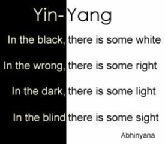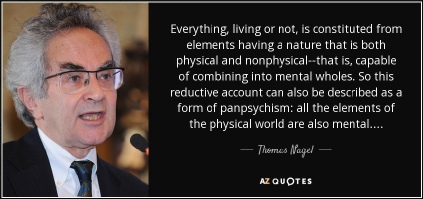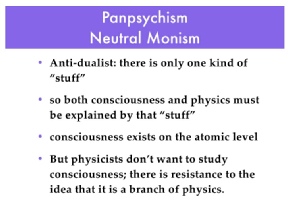


Philosophical musings on Quanta & Qualia; Materialism & Spiritualism; Science & Religion; Pragmatism & Idealism, etc.



 NEXT
NEXT
 BACK
BACK
Glossary Hints :
Glossary terms are indicated in the blog text by the dark blue color : BothAnd
A click on the linked term will take you to the glossary definition.
For more information on technical terms, go to the indicated links, both internal and external








GLOSSARY OF TECHNICAL TERMINOLOGY
|
New Ageism :
An alternative religious movement that spread through the occult and metaphysical communities in the 1970s and 80s. It looked forward to a “New Age” of love and light and offered a foretaste of the coming era through personal transformation and healing. The movement’s strongest supporters were followers of modern esotericism, a religious perspective that is based on the acquisition of mystical knowledge and ritual magic. Its eclectic doctrines borrow from Eastern & Western occult traditions. Note : although some of its pandeistic & panpsychic cosmology may seem similar to Enformationism, its antiscience & irrational attitude is in opposition. https://en.wikipedia.org/wiki/New_Age
|
|
Noumena :
Metaphysical objects (ideas) that are inferred by the sixth sense of Reason. Contrasted with Phenomena : physical objects (things) that are detectable by the five senses. Life, Mind , Consciousness, and Feelings are noumenal. [ see Meta-physics ]
|
|
PanEnDeism :
Panendeism is an ontological position that explores the interrelationship between God (The Cosmic Mind) and the known attributes of the universe. Combining aspects of Panentheism and Deism, Panendeism proposes an idea of God that both embodies the universe and is transcendent of its observable physical properties.
https://panendeism.org/faq-and-questions/
1. Note : PED is distinguished from general Deism, by its more specific notion of the G*D/Creation relationship; and from PanDeism by its understanding of G*D as supernatural creator rather than the emergent soul of Nature. Enformationism is a Panendeistic worldview.
|
|
Panpsychism :
Literally, “all mind”. The belief that everything material, however small, has an element of Mind. Higher, more complex, forms of Mind are called “awareness” or “consciousness”. Lower & simpler forms are called “energy” or “information”. [ See Enformationism ]
|
|
Philosophy :
The ancient Greeks began to distinguish the rational search for understanding of the world from the myth-making of religion. They became skeptical of prophets & seers, who were often ambiguous or dead-wrong in their proclamations. So they decided to rely on the only source of knowledge they could trust implicitly, their own personal reasoning ability. Unfortunately, the disciples of philosophers, like those of religious founders, tended to turn their time- & culture-bound doctrines into dogmas for all times & places. But by judicious application of information from all three forms of knowing, we can enjoy the practicality of Science, the Mystery of Religion, and the Rationality of Philosophy. [ See Philosophy popup ]
Since modern Science has become very successful at discovering practical physical knowledge, and Religions still have mass appeal as the gateway to supernatural wisdom, Philosophy has been relgated to the nerdy niche of metaphysical understanding. So philosophers usually offer their expert opinions on a few basic questions : 1. How can we know what’s real & true? (Ontology), 2. What is the right thing to do? (Ethics), and 3. What should we believe? (Values) The latter is not about blind Faith, but about the science of Probability. Philosophy is not a practical method for influencing Nature, or other people, but only for self-control. So it’s purpose is merely to correct your own worldview, your vision of reality.
|
|
Potential :
Unrealized or unmanifest creative power. For example the Voltage of an electric battery is its potential for future current flow measured in Amps. Potential is inert until actualized by some trigger. In the Enformationism metaphor, the real world was originally an idea in the Mind of G*D, with the infinite possibilities of Omniscience, that was realized by an act of Will. [ see Chaos ; see Potential Innovation at right]
|
Philosophy :
Many of today’s scientists are dismissive about the role of philosophy in the modern world. For example, Steven Hawking said “philosophy is dead”, and Richard Feynman pointed out that philosophy is impractical, if not completely useless. Neo-Marxist Rosa Lichtenstein declared that, “The only theory we need is scientific; anything else amounts to a capitulation to idealism (the belief that there are non-material things running nature that science cannot study)."
Those authorities in their own fields may or may not agree that Science & Philosophy occupy non-overlapping magistera (see Magisterial Hierarchy above). Science is about Physics, while Philosophy is about Metaphysics. If there is nothing non-physical about the world, then philosophy is a waste of time. But Quantum physics seems to imply that the foundations of the material world are immaterial : fields.
Besides, we need to keep in mind that The only proven science “facts” are the ones embodied in technology. Everything else remains theory, and subject to philosophical inquiry. Sometimes religious boasts of revealed truth cause scientists to respond in kind, with claims of “real” truth.
Immanuel Kant, the pioneer of modern metaphysical philosophy said that he was interested primarily in three “cardinal” questions : 1. What can I know?, 2. What ought I to do?, And 3. What may I hope? This blog is also a quest for answers to those same queries about Knowledge, Ethics, and Faith.




Potential Innovation:
The notion of an immaterial goal-seeking principle that motivates the behavior of both animate and inanimate entities has been entertained by thinkers through the ages. Aristotle coined the term Entelechy to represent a fundamental internal ambition to be more than it is. It explains a variety of transformations in Physics and Metaphysics, where mechanistic accounts are unknown.
Modern Science also lapses into metaphysics with terms that imply goal-directed action. The “power” of an electric battery to cause machines to work is called “Potential”, because the actual work remains in the future. Likewise quantum fields harbor Virtual Particles that are not yet real, pending the intentional poke of a mind.
Other technical but spooky terms for immaterial potential are Soul, Elan Vital, Will, etc. They produce seemingly ententional behavior without any overt evidence of physical energy exchange. In place of energy, we can only detect exchanges of Information.
The dynamics of trans-formation and innovation are due to what I call EnForm- Action : the teleological force of divine “Will”, imagined metaphorically as stored-up creative power as in an electric battery. That potential is released only when a circuit is completed by making a real connection between two poles.







 NEXT
NEXT
 BACK
BACK










